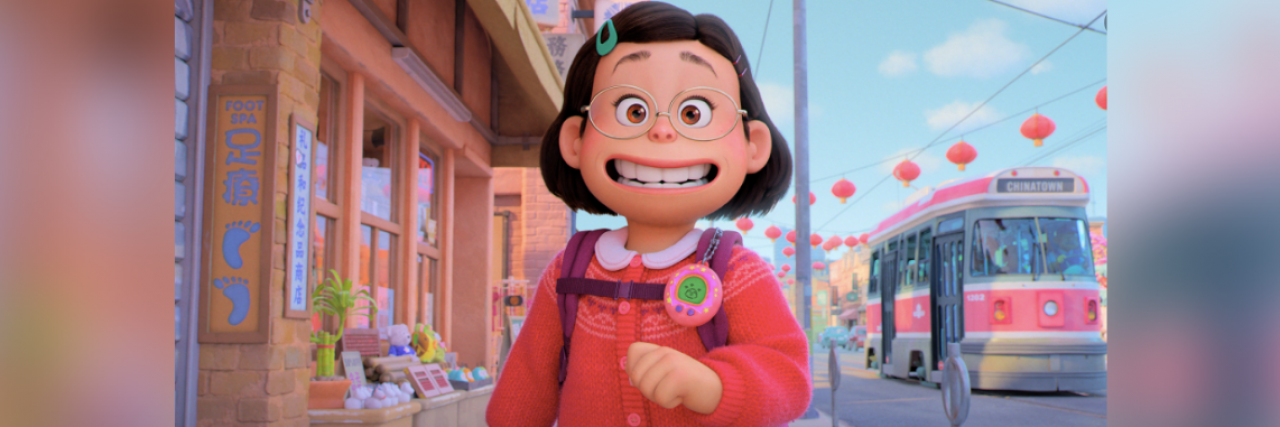My four daughters and I watched Disney’s new movie “Turning Red” for the second time tonight. It’s about a quirky 13-year-old girl who, seemingly overnight, develops all kinds of feelings and hormone rushes and then — poof — turns into a giant red panda. Hilarity and chaos ensue. I won’t give any spoilers, but the big idea is that she just has to last a month until she can undergo a ritual that will lock away the panda for good.
The movie explores mother-daughter relationships, friend relationships, and the longing to fit in that most of us went through at that age. And of course, it spends some time tackling the subject of puberty in a very open and hilarious way. Most other reviews have covered the puberty angle of the movie. But I was more struck by how the movie depicted the relationship between Mei Lee and her mother. Mei Lee’s mom clearly loves and wants the best for her daughter, but is quick with criticism and judgment of her daughter’s world. As a result, Mei Lee hides her true self from her mom.
There is a scene where Mei Lee’s mom finds a notebook full of (innocent yet cringy) drawings of boys and immediately has a huge, embarrassing outburst. The scene was physically painful to watch. I had a very similar experience with my own mother that was humiliating and soul-crushing. It was the first time that I realized my true self was not safe with my mother and I needed to hide away any messy feelings.
Another scene that hit home for me was at a party where Mei Lee’s mother accuses her friends of influencing her to be the silly teen she is. Mei Lee is forced to make a choice between her friends and her mother. She chooses her mother. I also was in that situation several times and it is a frustrating, maddening position to be in, when you are torn between the people that know you the best and accept you for who you are versus the mother who, though she provides for you and keeps you physically safe, doesn’t fully accept you. You know there will always be things you have to keep hidden. Her love is conditional on her approval.
Finally, (and I’m going to try to explain this without any spoilers)… there is a scene near the end where Mei Lee is wandering in a dreamlike bamboo forest, sort of an ‘in-between’ place. She finds her own mother (named Ming) as a teenager crouched on the ground and crying. Ming cries out “I’m so sick of being perfect! I’m never going to be good enough for her…or anyone.” We realize that the same disapproval she applies to Mei Lee was applied to her as a young woman. Mei Lee tells her, “I know it feels that way all the time, but it isn’t true.”
She leads her mother sniveling and downcast through the forest to an open area with all the aunts and her grandma. Ming and her mother embrace, and she finally receives the unconditional approval she so desperately needs. “You don’t have to apologize. I’m your mother.” Grandma says.
Cue tears. Regret flowed in for the relationship with my mother I always desperately wanted but never had. I know I’m not alone in this because I’ve spoken to adult daughters who have similar regrets about their relationship with their moms.
Yet there is hope. My four daughters are still young enough that I have time to change the narrative. Just like Mei Lee, I can change my daughters’ future. They don’t have to grow up as we did, hiding their true nature out of fear of disapproval. We can share our struggles with them and show them that we are human. We can realize that our children are not a measure of ourselves. They should have the freedom to be their own person and not have to worry about their self-image.
Between the “Far From the Tree” short, “Encanto,” and now “Turning Red,” I think a generation of filmmakers are processing their childhoods and producing films that show young people deciding to change the parenting narrative. As I grow older and walk further into the work of raising daughters, I’m stepping into the freedom that comes with untangling unhealthy generational patterns. I ask myself, “What kind of mom did I need as a girl?” and let than inform me how I parent my daughters.

